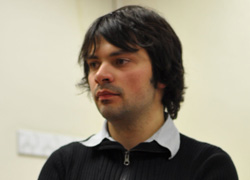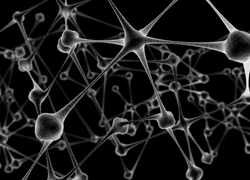IMDEA Networks

Archivos: Events
A SOFT Way for OpenFlow Switch Interoperability Testing
In this talk, I will present SOFT, a tool for testing the interoperability of OpenFlow switches. Our key insight is in automatically identifying the testing inputs that cause different OpenFlow agent implementations to behave inconsistently. To this end, we first symbolically execute each agent under test in isolation to derive which set of inputs causes which behavior. We then crosscheck all distinct behaviors across different agent implementations and evaluate whether a common input subset causes inconsistent behaviors. Our evaluation shows that our tool identified several inconsistencies between the publicly available Reference OpenFlow switch and Open vSwitch implementations.
Seguir leyendo arrow_right_altMobile Communications Networks: Evolving through Biologically-Inspired Technologies
Mobile communications networks have been evolved through multiple technologies over a period of several decades, to a stage that they become very complicated in the context of resource control and management. The heterogeneous next generation mobile network (NGMN) now includes a variety of network technologies and topologies incorporating with one another to provide a wide range of services; operate in a variety of channel conditions and environments; and within a single universal end user device. NGMN will need to be offered as an integrated system, and to promote interoperability among networks, offer global coverage and seamless mobility, enable the use of a universal handheld terminal, and enhance service quality compared to current wired networks. NGMN will be the infrastructure of the true mobile Internet.
Seguir leyendo arrow_right_altLow cost Network Coding for Collaborative Video Streaming
We focus on collaborative video streaming in wired overlay networks using low cost network codes. We propose a scheme that builds on both rateless codes and network coding in order to improve the system throughput and the video quality at clients. Our hybrid coding algorithm permits to efficiently exploit the available source and path diversity, without the need either for expensive routing or for scheduling algorithms.
Seguir leyendo arrow_right_alt4GSensor, Paradigms for the Next Generation Wireless Sensor Networks
Si desea más información sobre el Dr. Tiago Camilo, visita su perfil en Linkedin: http://www.linkedin.com/in/tiagocamilo
Más información sobre Nokia Siemens Networks
Seguir leyendo arrow_right_altLa Ciencia es mi Vida
Con el título La Ciencia es mi Vida, entre las 19:00 y las 21:00 horas del viernes 28 de septiembre de 2012, se va a celebrar en la Residencia de Estudiantes de Madrid (calle Pinar 21-23) una mesa redonda que, moderada por el catedrático de Física Teórica Alfredo Poves, va a reunir a varios investigadores de los Institutos Madrileños de Estudios Avanzados (IMDEA).
Seguir leyendo arrow_right_altESNOG/GORE 2012 – Evento de networking
El próximo miércoles, 13 de noviembre, se celebra en la Escuela Politécnica Superior (Campus de Leganés) de la Universidad Carlos III de Madrid (UC3M), la próxima reunión de ESNOG/GORE (España Network Operators Group / Grupo de Operadores de Red Españoles), contando con el patrocinio de la Cátedra Telefónica de la UC3M y ESPANIX (Punto neutro Español de Internet). Es una jornada que tendrá en agenda una serie de conferencias y mesas redondas sobre Internet a nivel de red.
Seguir leyendo arrow_right_altPeer-to-peer vs. IP multicast: comparing approaches to IPTV streaming based on TV channel popularity
Already a popular application in the Internet, IPTV is becoming, among the service providers, a preferred alternative to conventional Broadcasting technologies. Since many of the existing deployments have been done within the safe harbor of telcos own networks, IP multicast has been the desired streaming solution. However, previous studies showed that the popularity of the TV channels follows the Pareto principle, with the bulk of TV channels being watched only by a small fraction of viewers. Recognizing the potential scalability issues, we believe that multicast streaming approach may not be desirable for unpopular TV channels, especially when there are many such channels in the provider's service package. For this reason, the peer-to-peer content distribution paradigm is seen as an alternative, in particular for non-popular content. In order to analyze its viability, in this paper we perform a comparative analysis between IP multicast and a peer-to-peer overlay using unicast connections as streaming approaches, in the context of channels with different degrees of popularity. Our findings show that while multicast is always more efficient in terms of bandwidth utilization, peer-to-peer has a comparable performance for unpopular channels with a low number of viewers.
Seguir leyendo arrow_right_altAdvanced Computer Networks
This seminar builds on your basic knowledge of computer networks from an introductory computer networks class or equivalent. It covers mathematical and algorithmic foundations of the essential networking functions of data transfer, transfer control, and management. Essential concepts of some techniques, such as optimization, control theory, queuing theory, and their application to networks are covered.
Seguir leyendo arrow_right_altNetworked 3-D Virtual Collaboration in Science and Education: Towards ‘Web 3.0’ (A Modeling Perspective)
Combined advances in high speed networking, mobile devices, application sharing, web services, virtual world technologies and large scale event processing are converging to create a new world of pervasive, ubiquitous “presence” of users, which offers tremendous potential for social interaction and co-creation. The communication networking and computing requirements of this converged human-centric environment are also increasing at an accelerated pace. In this new environment, it is imperative that the much-needed networking and computing resources align closely with the needs and patterns dictated by the applications, social networks, and by the human users. We believe that the success of such socio-technical systems will hinge on the way networks capture and interact with human presence and location, in all of its physical, virtual and perceived aspects.
Seguir leyendo arrow_right_altRouting and capacity resilient network design
espite the broadly title, the seminar will be focused in the notion of max-min fairness (MMF) and its application to routing optimization in communication networks:
1. Basic notions
2. Convex MMF problems
3. Non-convex MMF problems
4. Examples of MMF routing optimization problems












Comentarios recientes